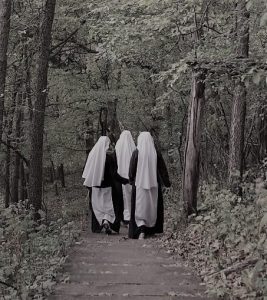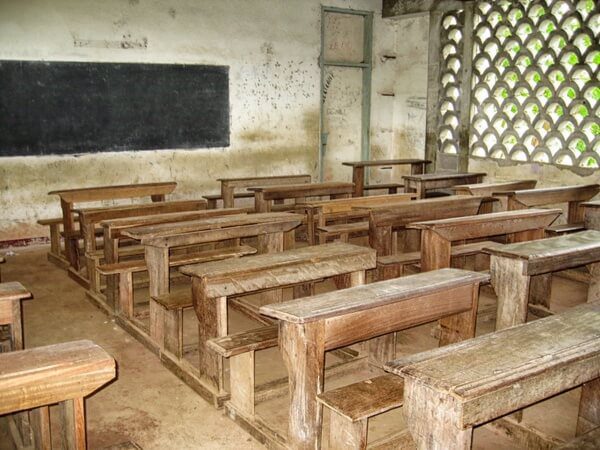Shernaz shares her experiences of studying in a Convent and staying in a boarding house run by Catholic nuns. Secularism was practised in word and deed. An exclusive for Different Truths.
Julio Rebeiro, retired IPS officer, decorated, illustrious, respected and highly admired Indian wrote not too long ago in an article: Education, in particular, has been their forte. Many schools, colleges, related establishments that teach skills for jobs have been set up and run by Christians. They are much in demand. Even diehard Hindus have sought admission in such centres of learning and benefitted from the commitment and sincerity of Christian teachers. Incidentally no one seems to have been converted to Christianity, though many have imbibed Christian values…
I agree with him. We were a motley bunch of boarders in our co-ed convent school… Catholics, Muslims, Rajputs, Parsis, Anglo-Indians, Maharashtrians, Sindhis, Gujaratis from South Africa, South Indians, Jews – all girls, the majority being non-Christians. We never formed communal groups and were always discouraged from doing so. I am talking about mid 1950s-1960s.
It was a poor convent and the food served made us long for the simplest ‘ghar ka khana’ but the all-round education imparted was of high quality. Those who could afford paid the princely sum of Rs.60/- a month while the rest paid by helping in the kitchen or doing other mundane chores.
It was a poor convent and the food served made us long for the simplest ‘ghar ka khana’ but the all-round education imparted was of high quality. Those who could afford paid the princely sum of Rs.60/- a month while the rest paid by helping in the kitchen or doing other mundane chores. That was the only differentiation. In  every other respect there was equality.
every other respect there was equality.
We sat on benches at two long tables and ate the same food (fixed quantity), which as I said in the above paragraph left a lot to be desired in taste and quality. When we were served dishes that were rather unpalatable, except perhaps to one or two girls, the food surreptitiously travelled from plate to plate. The last one to have a full plate, in this tough secret endeavour had to eat it, like it or not. It was too risky to send it on a return journey! If we got caught by the supervising nun it was bye-bye next meal. It didn’t matter on whose plate it was served and whose plates it traveled across during its short, clandestine trip. Our only enemy was food we couldn’t gulp. We didn’t think even for a moment that it had been on a non-so-and-so’s plate. Our parents were well aware of what used to go on 
If caste was a non-issue so was religion and no discrimination was made based on that. We non-Catholics enjoyed respectful freedom to practice our own religions and follow our traditions and festivals. Not once in all those years of schooling did we come across an instance when a conversion was even attempted.
If caste was a non-issue so was religion and no discrimination was made based on that. We non-Catholics enjoyed respectful freedom to practice our own religions and follow our traditions and festivals. Not once in all those years of schooling did we come across an instance when a conversion was even attempted. Some of us were part of the church choir, we used to attend church services, we made retreats and yet there were no conversions. Not even oblique references.
We sisters studied in a convent, so did my mother and my father-in-law went to a school run by Christian missionaries. We have all remained Parsis.
The toppers in almost every class were again not Christians, but the real meritorious ones, interring the belief that Christians would be favored. Our teachers had names like Prajapati, Mistry, Solanky, Rana, Dhanbhoora, Topiwala, Roy and Sikligar together with Fernandes, McClure, D’Souza and D’Costa. They sat in one common room, lunched together and were good friends.
It was only after we were out in the big world, away from the secular environs of the convent, that I was smacked in the face by the ugliness of casteism and communalism.
It was only after we were out in the big world, away from the secular environs of the convent, that I was smacked in the face by the ugliness of casteism and communalism. I’ll give one instance of each because their impact stays with me till today.
Some years after leaving school I reconnected with a classmate. We used to correspond and as he was going to be in town once, I invited him over to my house. He refused and would not let me visit him at his sister’s place either. It was perplexing.
“We are Harijans and your family members will not like me visiting you,” was his explanation. I was flabbergasted to put it mildly! His sister had been in the boarding with us and she was one of the cleanest, friendliest and among the well-loved girls.
“We are Harijans and your family members will not like me visiting you,” was his explanation. I was flabbergasted to put it mildly! His sister had been in the boarding with us and she was one of the cleanest, friendliest and among the well-loved girls. And till he revealed we didn’t know what caste they belonged to! Even now I couldn’t see how it would matter.
Finally, I made my husband persuade him. He visited me at home but still refused to have a meal with us. When I met him that time, I was shaken to see a nervous, edgy man, all the time expecting to be insulted and thrown out of the house, because insults and marginalization was what he and his sisters had faced after their return to India, except in the convent!
I was teaching different forms of greeting to a class of eight-year–old children, one child stood up and said something derogatory in response to Salaam aalekum. It was revolting and painful to hear that his father had taught him that.

To quote another instance, when I was teaching different forms of greeting to a class of eight-year-old children, one child stood up and said something derogatory in response to Salaam aalekum. It was revolting and painful to hear that his father had taught him that. On probing further, I realised to my dismay that kids were being mentally ghettoized from a very early age in their homes and in society. And those who tried to make them unlearn this mentality were not looked upon favorably.
Children’s minds are molded before they enter school. They come preconditioned with attitudes that are difficult to change, particularly when parents oppose. And they can become belligerent when their children are taught what goes against their ‘ethics’. I had a student whose father once came to my house and shouted angrily at me, literally, because I had taught the children in the Moral Science class that they should not lie! He wanted that subject removed from the syllabus!
The convent where our younger sister did her schooling, had nuns who also worked in a hospital for lepers. They were all young sisters from Europe who had dedicated their lives to the service of these ill-fated people…ill-fated because they had been thrown out by their families
The convent where our younger sister did her schooling, had nuns who also worked in a hospital for lepers. They were all young sisters from Europe who had dedicated their lives to the service of these ill-fated people…ill-fated because they had been thrown out by their families, were shunned by the rest of their countrymen as untouchables and lived deplorable lives. Even pariah dogs were treated better! Again, these nuns only helped ease their lives, no one was converted. I know because we had visited the hospital more than once and spoken to the patients who had only tears of gratitude for their selfless benefactors.
Going back to the school of my student years, ours was a school where we were taught to be human and humane above all things and I bow in respect to the Christian nuns, priests and all the teachers who shaped our lives.
Photos from the Internet






 By
By
 By
By
 By
By
 By
By
Dear Shernaz,
i was not convent-educated. I studied in a government aided school from class 6 to 12. That was way back from 1959 to 1966 in a small town in Andhra Pradesh. And I was a boarder for 7 years (upto degree) at a common Chaultry run by Simhachalam devasthanam for economically poor students. The atmosphere was very cordial, there were references to caste and religion occasionally, but they never stood between friendships and taking food from a common kitchen or serving or being served.
your article has taken me back to those golden years and I had a chance to recollect my friends and teachers. Of course, their form was clear in my mind though some of their names slipped from my memory.
Thank you.
It is indeed heartening to know that you to grew up and studied in an atmosphere of congeniality and not one corroded by the tyranny of caste and other prejudices. I am sure there must be plenty who were fortunate as we were, Yes, always feels good to visit those days. I am in touch with many of my colleagues from school.
Thank you for reading and responding to the article, Murty.